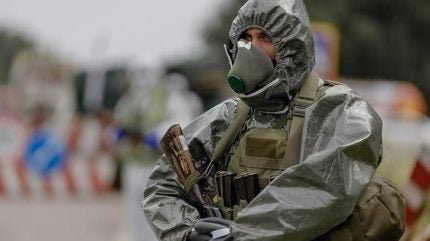
Following intermittent reports in 2024 citing evidence that Russian forces have used chemical weapons in Ukraine, the UK Ministry of Defence (MoD) has assured its continued support to protecting Ukraine’s forces.
In a parliamentary written response on 14 January 2025, the UK Armed Forces Minister, Luke Pollard, stated that the MoD “continues to assess and monitor the evolving threat picture in Ukraine.” Particularly when it comes to coordinating countermeasures against Chemical, Biological, Radiological, and Nuclear (CBRN) threats.
The Minister pointed out that British security assistance to Ukraine included respirators and decontamination kits, most recently in December 2024 as part of a package of support jointly financed by partners in the G7-led Global Partnership Against the Spread of Weapons of Mass Destruction.
CBRN cases in 2024
In July 2024, experts from the Organisation for the Prohibition of Chemical Weapons (OPCW) conducted a Technical Assistance Visit in Ukraine upon the country’s request to deliver non-military detection and protection equipment and train Ukraine’s State Emergency Service.
However, it is worth noting that despite accusing one another of using chemical weapons at the time, last July, the OPCW found that “the information provided to the Organisation so far by both sides… is insufficiently substantiated.”
Nearly three months later, in October, Russian forces are said to have admitted using hazardous chemical weapons on the battlefield in Ukraine, with widespread use of Riot Control Agents and multiple reports of the use of chloropicrin – a choking agent that causes severe irritation to the eyes, skin, and lungs which was first used during the First World War.
How well do you really know your competitors?
Access the most comprehensive Company Profiles on the market, powered by GlobalData. Save hours of research. Gain competitive edge.

Thank you!
Your download email will arrive shortly
Not ready to buy yet? Download a free sample
We are confident about the unique quality of our Company Profiles. However, we want you to make the most beneficial decision for your business, so we offer a free sample that you can download by submitting the below form
By GlobalDataAt that time, the Russian Ministry of Foreign Affairs justified its use of CBRN threats by baselessly accusing Ukrainian armed formations of using chlorine, ammonia, ammonium nitrate, and sulfuric acid against Russian military units.
Nevertheless, the Kremlin has a deep history of using chemical weapons against enemies of the rogue state, such as their use of Novichok on the streets of Salisbury in 2018.

Pre-empting Russian war methods
The CBRN threat is just one of many dubious methods of war that Russia’s forces are using against Ukraine. Other lethal and indiscriminate methods include planting vast swathes of mines and hybrid strikes combining one-way-attack drones and many missile types.
Allied Capability Coalitions are forming to prevent such methods of war, notably the Lithuanian-led demining group to uncover more than 174,000 square kilometres, or 28% of Ukraine’s territory.
Others include the Drone Capability Coalition, co-led by Latvia and the UK, to support Ukraine’s manufacture of uncrewed systems and secure a reliable supply chain for the emerging military technology.
Currently, there is no Capability Coalition when it comes to countering Russian CBRN threats. Though, this may be due to the difficulty of proving its use against Ukrainian troops.
Government and defence organisations have grouped counter-CBRN equipment with their medical supplies in security packages. But if the Russian government decides to resort to tactical nuclear weapons, which is unlikely, but not improbable – as its use of an IRBM indicates – then a coalition effort in the CBRN space specifically may be worthwhile.


